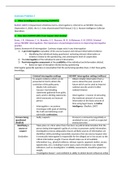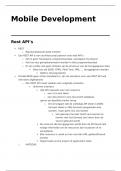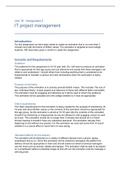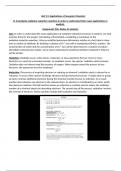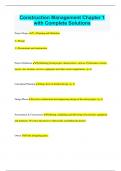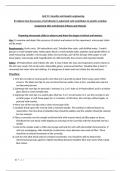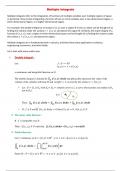Summary Problem 3
1. What is intelligence interviewing (HUMINT)?
Redlich (2007) In Department of Defense terms, interrogation is referred to as HUMINT. Recently
(September 6, 2006), the U.S. Army disseminated Field Manual 2-22.3, Human Intelligence Collector
Operations
2. How does HUMINT differ from Suspect Interviewing?
Evans, J. R., Meissner, C. A., Brandon, S. E., Russano, M. B., & Kleinman, S. M. (2010). Criminal
versus HUMINT interrogations: The importance of psychological science to improving interrogative
practice
Generic framework of interrogation- 3 primary stages exist in any interrogation
1) A pre-interrogation evaluation of the source/suspect and relevant information/evidence
Identifying the individuals being questioned, reviewing relevant information or
evidence related to the questioning, and assessing the level of cooperation.
2) The interrogation of the individual to extract information
3) Post-interrogation assessment of the credibility of the individual and information elicited.
Based on signs of deception elicited during questioning
Interrogator generally operates on assumption that the party being question does, in fact have guilty
knowledge.
Criminal interrogation settings HUMINT interrogation settings (military)
Goal To acquire evidence which can be - Obtain reliable information from a
presented at trial to obtain the source about the past, present or
conviction of the guilty party. future which can be used to improve
- Ideally: full confession national security and/or further
- Success= incriminating national interest
statements gathered from guilty
party and/or eliciting statements - Interrogation = manner of extracting
which exonerate an innocent the maximum amount of accurate
person information in the lease amount of
time using legal means. & Gather
- Interrogation = accusatory Intelligence (Redlich, 2007)
monologue with goals of eliciting
the truth and obtaining court-
admissible confessions.
Persons being - Guilty suspects - Persons in community tangentially or
questioned unrelated to war, as well as suspected
(Redlich) enemy terrorists
Identifying a - Takes place at a time when there has been no judicial determination that the
source or person being interrogated is guilty of a crime or possesses useful information.
suspect - Investigative process adequately ensures all likely sources of information are
identified, while providing reasonable assurance that any source/suspect who
Similarities is eventually interrogated is responsible for the alleged act or has access to the
critical information sought. Process should make use of all available
information (e.g., physical evidence, witness reports, apparent motive, access,
opportunity, etc.), including in some cases a lack of evidence. Less reliable
indicators, such as investigators’ credibility assessments, should be given less
weight.
- ‘Investigative biases”: overconfident in ability to detect deceit; influences initial
, assessment of credibility, and eventually conduct of interrogation .
Initial - General information about individual (incl. alibi in criminal context) can be
assessment of obtained and the interrogator can assess his/her level of cooperation, quality
the source or of information, and nature of any potential resistance.
suspect
Similarities
- Individuals alibi found - Individuals lack of knowledge
Differences interrogation ends interrogation ends
- Assessment based on guidelines
provided by training manuals
(e.g. Reid Technique), + assess
credibility based upon verbal
and nonverbal cues to deception
Planning and - Preparation generally involves the collection of all available information
preparation pertaining to the individual and the topics of interest.
- Goal of questioning at most basic level is to obtain reliable information;
Similarities interrogators familiarize themselves with any information that’s already
established to determine if the information provided by the individual is
consistent.
- Interrogators should maintain an appropriate mindset when considering the
info and planning the interrogation so as to reduce the influence of
investigative biases.
Research - Cooperation suggests that the subjects are providing any information they
operational possess of intelligence value and/or information of value to an investigation.
accord/ - Interrogators share the conviction that a subtle, relationship-building approach
methods of informed by cultural acuity and subject matter expertise is consistently a more
interrogation effective way to reach operational accord than, methods that involve
intentional application of psychological, physical and or emotional stress.
Similarities Operational accord: describes interrogator-interviewee relationship
‘marked by a constructive degree of conformity by the interviewee and/or
a mutual affinity between the interviewee and the interrogator.
Rapport: approach that employs interpersonal, cultural, and/or
linguistic skills to establish a non-adversarial, productive relationship
between interrogator and interviewee.
Differences - Some methods can increase - Forceful methods of interrogation
likelihood of false confessions may cause a source to respond to
(minimization, maximization) questions in a manner that appears to
satisfy the interrogator’s objectives,
regardless of whether or not the
source actually possess relevant
information.
Conducting the Interrogator explores individual’s scope of knowledge i.c.w. more subtle means of
interview elicitation to mask the interrogator’s agenda and the current gaps in information or
evidence.
Similarities - Attributing responsibility and gaining knowledge are of substantial importance.
- Both interrogations rely on psychologically oriented tactics (developing
rapport and approach phase) (Redlich)
1. What is intelligence interviewing (HUMINT)?
Redlich (2007) In Department of Defense terms, interrogation is referred to as HUMINT. Recently
(September 6, 2006), the U.S. Army disseminated Field Manual 2-22.3, Human Intelligence Collector
Operations
2. How does HUMINT differ from Suspect Interviewing?
Evans, J. R., Meissner, C. A., Brandon, S. E., Russano, M. B., & Kleinman, S. M. (2010). Criminal
versus HUMINT interrogations: The importance of psychological science to improving interrogative
practice
Generic framework of interrogation- 3 primary stages exist in any interrogation
1) A pre-interrogation evaluation of the source/suspect and relevant information/evidence
Identifying the individuals being questioned, reviewing relevant information or
evidence related to the questioning, and assessing the level of cooperation.
2) The interrogation of the individual to extract information
3) Post-interrogation assessment of the credibility of the individual and information elicited.
Based on signs of deception elicited during questioning
Interrogator generally operates on assumption that the party being question does, in fact have guilty
knowledge.
Criminal interrogation settings HUMINT interrogation settings (military)
Goal To acquire evidence which can be - Obtain reliable information from a
presented at trial to obtain the source about the past, present or
conviction of the guilty party. future which can be used to improve
- Ideally: full confession national security and/or further
- Success= incriminating national interest
statements gathered from guilty
party and/or eliciting statements - Interrogation = manner of extracting
which exonerate an innocent the maximum amount of accurate
person information in the lease amount of
time using legal means. & Gather
- Interrogation = accusatory Intelligence (Redlich, 2007)
monologue with goals of eliciting
the truth and obtaining court-
admissible confessions.
Persons being - Guilty suspects - Persons in community tangentially or
questioned unrelated to war, as well as suspected
(Redlich) enemy terrorists
Identifying a - Takes place at a time when there has been no judicial determination that the
source or person being interrogated is guilty of a crime or possesses useful information.
suspect - Investigative process adequately ensures all likely sources of information are
identified, while providing reasonable assurance that any source/suspect who
Similarities is eventually interrogated is responsible for the alleged act or has access to the
critical information sought. Process should make use of all available
information (e.g., physical evidence, witness reports, apparent motive, access,
opportunity, etc.), including in some cases a lack of evidence. Less reliable
indicators, such as investigators’ credibility assessments, should be given less
weight.
- ‘Investigative biases”: overconfident in ability to detect deceit; influences initial
, assessment of credibility, and eventually conduct of interrogation .
Initial - General information about individual (incl. alibi in criminal context) can be
assessment of obtained and the interrogator can assess his/her level of cooperation, quality
the source or of information, and nature of any potential resistance.
suspect
Similarities
- Individuals alibi found - Individuals lack of knowledge
Differences interrogation ends interrogation ends
- Assessment based on guidelines
provided by training manuals
(e.g. Reid Technique), + assess
credibility based upon verbal
and nonverbal cues to deception
Planning and - Preparation generally involves the collection of all available information
preparation pertaining to the individual and the topics of interest.
- Goal of questioning at most basic level is to obtain reliable information;
Similarities interrogators familiarize themselves with any information that’s already
established to determine if the information provided by the individual is
consistent.
- Interrogators should maintain an appropriate mindset when considering the
info and planning the interrogation so as to reduce the influence of
investigative biases.
Research - Cooperation suggests that the subjects are providing any information they
operational possess of intelligence value and/or information of value to an investigation.
accord/ - Interrogators share the conviction that a subtle, relationship-building approach
methods of informed by cultural acuity and subject matter expertise is consistently a more
interrogation effective way to reach operational accord than, methods that involve
intentional application of psychological, physical and or emotional stress.
Similarities Operational accord: describes interrogator-interviewee relationship
‘marked by a constructive degree of conformity by the interviewee and/or
a mutual affinity between the interviewee and the interrogator.
Rapport: approach that employs interpersonal, cultural, and/or
linguistic skills to establish a non-adversarial, productive relationship
between interrogator and interviewee.
Differences - Some methods can increase - Forceful methods of interrogation
likelihood of false confessions may cause a source to respond to
(minimization, maximization) questions in a manner that appears to
satisfy the interrogator’s objectives,
regardless of whether or not the
source actually possess relevant
information.
Conducting the Interrogator explores individual’s scope of knowledge i.c.w. more subtle means of
interview elicitation to mask the interrogator’s agenda and the current gaps in information or
evidence.
Similarities - Attributing responsibility and gaining knowledge are of substantial importance.
- Both interrogations rely on psychologically oriented tactics (developing
rapport and approach phase) (Redlich)

